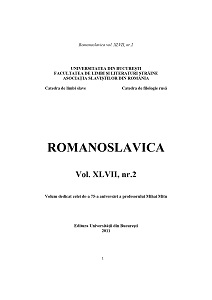Critica totalitarismului şi critica Occidentului la Czesław Miłosz
Criticism of totalitarianism and criticism of the West in Czesław Miłosz
Author(s): Florin-Ciprian MitreaSubject(s): Political Philosophy, Recent History (1900 till today), Polish Literature, Politics and society, American Literature
Published by: Editura Universităţii din Bucureşti
Keywords: intellectuals; totalitarianism; Western civilization; Eastern sensibility; suffering; liberty;
Summary/Abstract: From the outset, this article tries to describe the philosophical critique of totalitarianism developed on the basis of a critique of Western civilization (in its certain features), as an important category of modern political thought. In this perspective, thinkers as Eric Voegelin, Alexandr Zinoviev and Alexandr Soljenitsyn can be considered highly representatives. That’s why, one of the main endeavours of this article, entitled ”The critique of totalitarianism and the critique of West to Czeslaw Milosz”, is to demonstrate the legitimacy of comprising polish writer’s thought in such a philosophical category. In order to attain this aim, the author highlights two essential sizes of miloszian analytic model on totalitarianism. First of all, he is dealing with the ideology as a central element of the XX-th century’s political pathologies. In this context, the article proposes a comparison between the literary investigation from Milosz’s ”Captive Mind” and the philosophical approach formulated by Alain Besançon on the intellectuals grounds of leninism. Secondly, the author stands out the Eastern sensibility and outlook (based on the collective, although individual in the same time, experience of suffering) that Milosz considers to be the key component part of a certain spiritual superiority of the intellectuals from the countries which were crushed by the Elephant of History after 1945. Starting from this point, the article identifies some philosophical resemblances between Czeslaw Milosz, Leszek Kolakowski and Constantin Noica in the way of defining the concept of liberty (having as a ground the core dichotomy: spiritual values vs. material values).
Journal: Romanoslavica
- Issue Year: XLVII/2011
- Issue No: 2
- Page Range: 265-278
- Page Count: 14
- Language: Romanian

